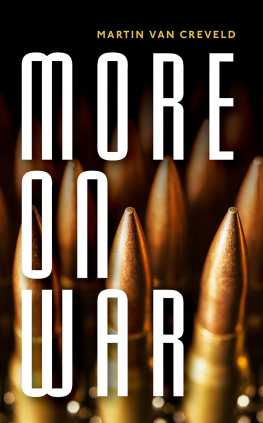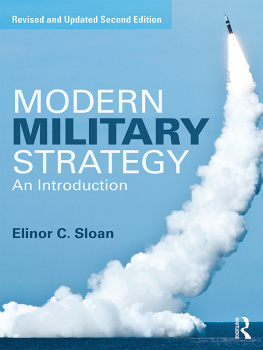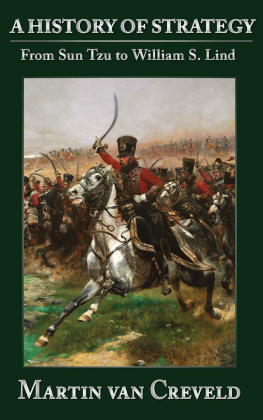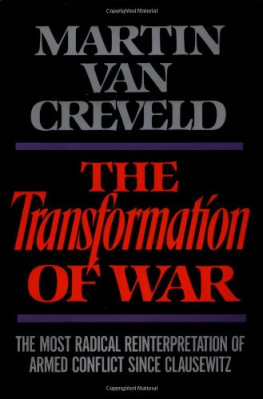Van Creveld - More on War
Here you can read online Van Creveld - More on War full text of the book (entire story) in english for free. Download pdf and epub, get meaning, cover and reviews about this ebook. City: New York, year: 2017;2016, publisher: Oxford University Press, Incorporated, genre: Politics. Description of the work, (preface) as well as reviews are available. Best literature library LitArk.com created for fans of good reading and offers a wide selection of genres:
Romance novel
Science fiction
Adventure
Detective
Science
History
Home and family
Prose
Art
Politics
Computer
Non-fiction
Religion
Business
Children
Humor
Choose a favorite category and find really read worthwhile books. Enjoy immersion in the world of imagination, feel the emotions of the characters or learn something new for yourself, make an fascinating discovery.
- Book:More on War
- Author:
- Publisher:Oxford University Press, Incorporated
- Genre:
- Year:2017;2016
- City:New York
- Rating:4 / 5
- Favourites:Add to favourites
- Your mark:
- 80
- 1
- 2
- 3
- 4
- 5
More on War: summary, description and annotation
We offer to read an annotation, description, summary or preface (depends on what the author of the book "More on War" wrote himself). If you haven't found the necessary information about the book — write in the comments, we will try to find it.
More on War — read online for free the complete book (whole text) full work
Below is the text of the book, divided by pages. System saving the place of the last page read, allows you to conveniently read the book "More on War" online for free, without having to search again every time where you left off. Put a bookmark, and you can go to the page where you finished reading at any time.
Font size:
Interval:
Bookmark:


Great Clarendon Street, Oxford, ox 2 6 dp , United Kingdom
Oxford University Press is a department of the University of Oxford. It furthers the Universitys objective of excellence in research, scholarship, and education by publishing worldwide. Oxford is a registered trade mark of Oxford University Press in the UK and in certain other countries
Martin van Creveld 2017
The moral rights of the author have been asserted
First Edition published in 2017
Impression: 1
All rights reserved. No part of this publication may be reproduced, stored in a retrieval system, or transmitted, in any form or by any means, without the prior permission in writing of Oxford University Press, or as expressly permitted by law, by licence or under terms agreed with the appropriate reprographics rights organization. Enquiries concerning reproduction outside the scope of the above should be sent to the Rights Department, Oxford University Press, at the address above
You must not circulate this work in any other form and you must impose this same condition on any acquirer
Published in the United States of America by Oxford University Press 198 Madison Avenue, New York, NY 10016, United States of America
British Library Cataloguing in Publication Data
Data available
Library of Congress Control Number: 2016946642
ISBN 9780198788171
ebook ISBN 9780191092299
Printed in Great Britain by Clays Ltd, St Ives plc
Links to third party websites are provided by Oxford in good faith and for information only. Oxford disclaims any responsibility for the materials contained in any third party website referenced in this work.
For those who study war, wherever it is studied, as long as it is studied.
You may not be interested in war, but war may be interested in you.
Leon Trotsky
This book has two sets of roots. The first push came back in 2010 when my friend, Major (ret.) Dan Fayutkin, who was then on the Israel Defense Forces General Staff, asked me to do a short essay on the essence of strategy. I did in fact write the piece; however, the IDF never took up the idea. As a result, the Hebrew version of the piece remains unpublished.
The second push came three years later when the Swedish War College asked me to participate in a conference on military thought they were organizing. I yield to nobody in my admiration for Sun Tzu and Clausewitz. Working on this volume, one of the first things I learnt was how hard writing theory really is. How Clausewitz in particular did it without using a word processor is beyond me. Still I have long felt that, with reason or without, they had not thought through certain things and answered certain questions. Now, I thought, my opportunity had come.
Other people who, in one way or another, have helped mesometimes without being aware that they didinclude Professor Emeritus Eyal Ben Ari; General (ret.) Prof. Yitzhak Ben Israel; Dr. Robert Bunker; Colonel (ret.) Dr. Moshe Ben David; Mr. Niv David; Dr. Steve Canby; Lieutenant Jeff Clement; Professor Emeritus Yair Evron; Dr. Asia Haun; Dr. Yagil Henkin; Mr. Hagai Klein; Major Dr. Lee Ting Ting; Dr. Jonathan Lewy (my beloved stepson); Dr. Edward Luttwak; Mr. Andy Marshall; Mr. Samuel Nelson-Mann; Colonel Prof. John Olsen; Dr. Tim Sweijs; General (ret.) Jake Thackeray; General (ret.) Dr. Erich Vad; Eldad and Uri van Creveld (my beloved sons); and Professor Martin Wagener. Each and all have made a substantial contribution to this book. But for them, it could not have been completed.
When I first undertook this task my dear wife, Dvora, doubted my ability to do it as it should be done. Now that it is complete, I still do not know whether I have convinced her. Never mind, Dvora. But for you this book, like most of the rest, would never have been born. I love you.
War is the most important thing in the world. When the chips are down, it rules over the existence of every single country, government, and individual. That is why, though it may come but once in a hundred years, it must be prepared for every day. When the bodies lie cold and stiff, and the survivors mourn over them, those in charge have failed in their duty.
So many books have been written on war that, had they been put aboard the Titanic, the ship would have sunk without any help from the iceberg. From Thucydides shortly before 400 bc to the present, there have been many excellent military historians. Their contribution to our understanding of war is immense and growing. Yet history and theory are not the same. History focuses on the specific, the transient, and the non-repeatable. It seeks to record what happened, understand why it happened, and, perhaps, where things may be going. Theory, on which more later, tries to discover patterns and uses them to draw generalizations valid for more than one time and one place. It both describes and, at times, prescribes the nature of the subject matter; what its causes and purpose are; into what parts it should be divided; how it relates to all sorts of other things; and how to cope with it and manage it.
In almost every field of human thought and action, good philosophers abound. They have examined their subjects, be they aesthetics or ethics or logic or the existence of God, and dissected them into their component parts. Next they re-assembled them, often in new and surprising ways that helped readers to expand their knowledge and gain understanding. Yet in two and a half millennia there have only been two really important military theoreticians. All the rest, including some who were famous in their own times, have been more or less forgotten.
Names such as Frontinus (c.40103 ad ), Vegetius (first half of the fifth century ad ), the Byzantine Emperor Maurice (539602), Antoine-Henry Jomini (17791869), Basil Liddell Hart (18951970), and many others matter only to a few specialists in the field. This even applies to Niccol Machiavellis Arte de la guerra (1521), which for two centuries gave its title to many other volumes in several languages. Yet Machiavelli is remembered almost exclusively because of his political thought rather than for anything he said about war and armies.
The reasons why these and so many other theorists were forgotten are close at hand. War is a practical businessso much so, some have claimed, as to discourage abstract thought about it. It has much in common with playing an instrument or, at the higher levels, conducting an orchestra. Those who wage it do so to gain victory, not to dish up all sorts of insights. In themselves, not even the best theories can save us from the enemys sharp sword. This fact made most theorists, who were hoping to proffer practical advice to practically minded commanders, focus on how to organize for war, wage war, fight in war, and so on.
As they did so, they often overlooked two facts. First, no two armed conflicts are ever the same. Second, war itself, forming an integral part of human history, is forever changing and will continue to change. The former problem caused many theorists to engage in a futile and/or pedantic quest for principles or maxims. The latter shackled them to their particular times and places. That again took them into the kind of detail that has long become irrelevant. For example, both Alfred Mahan (18401914) and Julian Corbett (18541922), the greatest naval theorists of all time, noted the importance of coal in naval warfare. The latter did so just when the Royal Navy was switching to oil, a very different commodity. Countless others have shared the same fate. Seeking to be up to date, they all but guaranteed that they would soon be out of date.
Font size:
Interval:
Bookmark:
Similar books «More on War»
Look at similar books to More on War. We have selected literature similar in name and meaning in the hope of providing readers with more options to find new, interesting, not yet read works.
Discussion, reviews of the book More on War and just readers' own opinions. Leave your comments, write what you think about the work, its meaning or the main characters. Specify what exactly you liked and what you didn't like, and why you think so.








